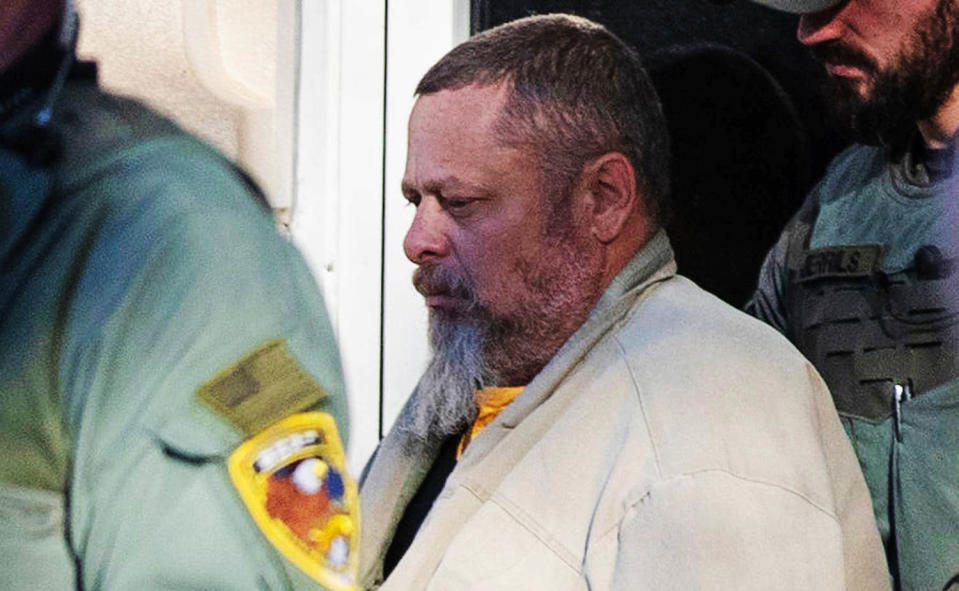Becky and Mike Patty had waited years for a verdict.
The Nov. 11 conclusion to the roughly four-week trial of Richard Allen, who was charged in the horrific murders of their granddaughter, Liberty German, and her best friend, Abigail Williams, felt like the biggest moment in their lives — something they’d worked hard to get to, the couple said in an interview with “Dateline.”
After four days of deliberations, the Pattys got what they’d hoped for: Allen, 52, was found guilty of murdering Liberty, 14, and Abigail, 13, near a walking trail in Delphi, north of Indianapolis, eight years ago.
Advertisement
Advertisement
But the absence of Abby and Libby — as the girls were known — still looms large.
“Do you say there’s winners?” Becky Patty said. “We got our verdict, but that didn’t bring the girls back. It doesn’t give us closure. It gives us a little bit of peace to know that he can never hurt another person again. And that’s where he should be.”
“But is it happy?” she added. “Not really.”
Allen, who is appealing the conviction, was sentenced in December to 130 years in prison.

Officers transport Richard Allen on Nov. 22, 2022, at Carroll County Courthouse in Delphi, Ind.
The case drew nationwide attention in part because of a grim piece of evidence uncovered in the aftermath of the murders: a brief, grainy Snapchat video recorded on Libby’s cellphone — and publicized by authorities — showed a possible suspect who came to be known as “the bridge guy.”
Advertisement
Advertisement
But the murders remained unsolved until 2022, when a volunteer helping organize thousands of tips in the case discovered a mislabeled “lead sheet” from years earlier with Allen’s name on it. According to testimony at Allen’s trial last year, she provided the document to a detective and Allen, a CVS clerk in Delphi, was arrested weeks later.
At trial, the prosecution argued that Allen used “power and fear” to force Abby and Libby down a hill near a then-abandoned rail bridge and cut their throats Feb. 13, 2017.
The girls had the day off from school — it was an unused snow day — and they’d gone to hang out at Monon High Bridge Trail, on the outskirts of Delphi. They disappeared that afternoon, and their bodies were found the next day, roughly a quarter-mile upstream from the bridge, authorities said at the time.
At trial, Carroll County Prosecutor Nick McLeland identified Allen as “the bridge guy” — the person captured in the video who was seen walking along the abandoned bridge wearing jeans, a hat and a dark jacket.
Advertisement
Advertisement
More in U.S.
“Down the hill,” a male voice is heard saying near the end of the video.
McLeland pointed to dozens of murder confessions Allen made during this pretrial detention to prison officials, a prison psychologist and his wife. The prosecutor also pointed to a .40-caliber bullet found at the crime scene that McLeland said had been matched to a gun that belonged to Allen through a ballistics analysis.

Flowers placed at the Monon High Bridge Trail in Delphi, Ind., on Oct. 31, 2022, near where Liberty German and Abigail Williams were last seen and where the bodies were discovered.
In court, Allen’s defense lawyers described him as an innocent man who denied having killed the girls and provided a false confession only after he’d been held in an environment that they compared to solitary confinement.
“It’s psychological warfare on a man who’s a pretrial detainee,” attorney Brad Rozzi told “Dateline.”
Advertisement
Advertisement
The defense also disputed the results of the ballistics analysis. At trial, Rozzi described the evidence related to the analysis as insufficient to prove a link between the bullet discovered at the scene and Allen’s gun.
In Allen’s initial interview with investigators, which was played for the jury, he acknowledged having been on the trail the day the girls were murdered but he repeatedly denied killing them.
The defense had also sought to present an alternative theory to the crime — that the girls were killed as part of a ritual sacrifice linked to a pagan Norse religion known as “Odinism” — but the judge overseeing the trial barred the lawyers from presenting that evidence.
In a lengthy pretrial filing, the defense pointed to what they described as ritual symbols at the crime scene — including sticks that appeared to have been arranged on the girls’ bodies — and said there were Odinist groups in the area that authorities investigated in connection with the killings.
Advertisement
Advertisement
In an interview with “Dateline,” Indiana State Police Lt. Jerry Holeman said the possible connection was investigated for months but no link was found.
“We did not have tunnel vision,” he said.
Mike Patty also believed the theory had been thoroughly investigated. In his view, the defense lawyers had failed to uncover any links between people associated with Odinism and the crime.
“Could you put any of those people that you’re saying it is in Delphi that day?” he told “Dateline.” “No. Could you tie them to the murder of Abby and Libby in any way? No.”
“They’re just trying to throw things at the wall, hoping something will stick,” Mike Patty added. “And the police and the investigative team did their due diligence on that.”
This article was originally published on NBCNews.com
EMEA Tribune is not involved in this news article, it is taken from our partners and or from the News Agencies. Copyright and Credit go to the News Agencies, email news@emeatribune.com Follow our WhatsApp verified Channel



